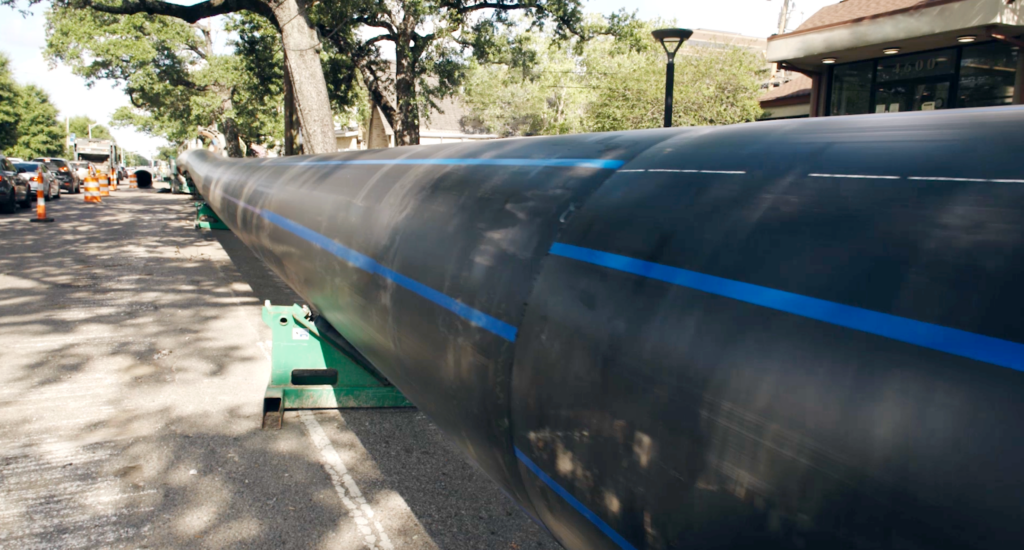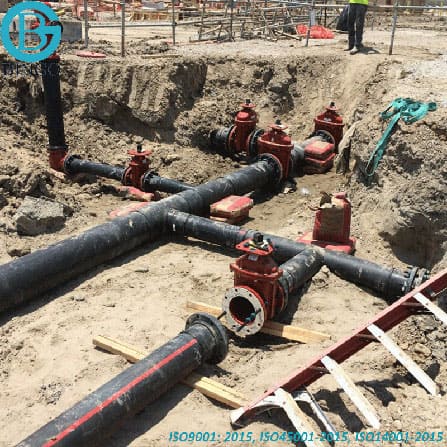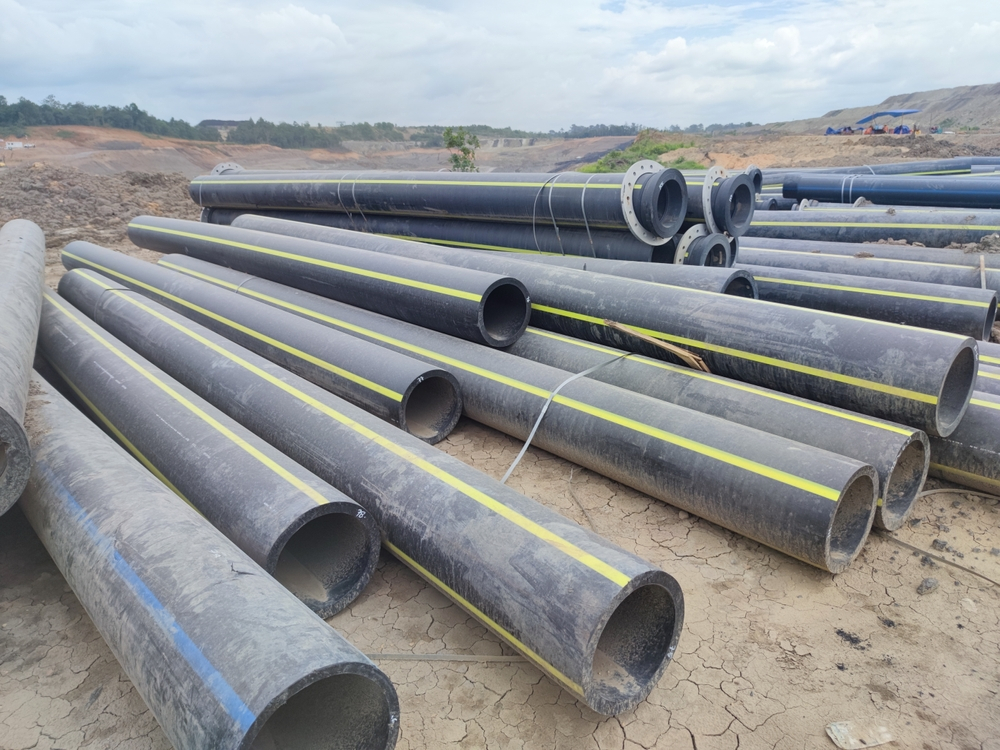The hidden benefits of choosing an HDPE Pipe Supplier
Wiki Article
Exploring the Leading Pipeline Manufacturers: Top Quality, Dependability, and Development
The pipeline manufacturing industry stands at the intersection of integrity, innovation, and high quality, driven by leading firms such as Tenaris and Vallourec. These manufacturers are not just dedicated to creating high-performance products yet are also introducing sustainable techniques that deal with modern-day environmental worries (Pipeline Manufacturer). As we check out the criteria that define quality in pipeline solutions, it becomes apparent that the landscape is quickly progressing. What certain advancements are arising, and exactly how are these innovations forming the future of pipeline facilities? The responses may redefine market standards in manner ins which are not yet completely recognizedLeading Manufacturers Overview
In the domain of pipeline manufacturing, a number of principals emerge as leaders, each contributing significantly to the sector's landscape. Companies such as Tenaris, Vallourec, and JFE Steel have actually developed themselves as frontrunners by constantly providing premium items that fulfill stringent industry standards. Tenaris, renowned for its ingenious services, concentrates on smooth and bonded pipelines, providing primarily to the oil and gas sector. Vallourec, a French multinational, focuses on the production of premium tubular services, emphasizing sustainability and advanced modern technology in its manufacturing processes.JFE Steel, a major Japanese manufacturer, is acknowledged for its comprehensive array of steel pipelines, particularly those made use of in power and facilities jobs. Their commitment to research study and development has allowed them to generate high-performance products that hold up against severe ecological problems. Furthermore, companies like united state Steel and National Oilwell Varco have expanded their market visibility by diversifying their item offerings and improving operational performances.
These leading producers not just dominate the marketplace however additionally drive advancement within the industry, establishing benchmarks for high quality and reliability that players aim to achieve. Their payments are vital for satisfying the boosting need for reliable and durable pipeline services worldwide.
Requirements for Quality Evaluation
Quality assessment in pipeline manufacturing rests on 2 essential standards: material longevity requirements and manufacturing process performance. Ensuring that materials fulfill rigorous toughness benchmarks is vital for the long life and integrity of pipelines. In addition, enhancing the manufacturing process can boost performance while maintaining high quality, eventually impacting total efficiency and safety and security.Product Toughness Standards
Ensuring the long life and reliability of pipeline materials is crucial for keeping framework honesty and operational efficiency. Material toughness criteria play a vital duty in evaluating the high quality of pipelines, dictating the performance and lifespan of the materials used in building. Manufacturers should stick to a variety of rigorous standards, including those established by organizations such as ASTM International and the American Oil Institute (API)These standards review different factors, consisting of corrosion resistance, tensile stamina, and exhaustion performance. For example, pipes made use of in corrosive environments need products that can endure chemical destruction, while those subjected to high-pressure conditions should exhibit extraordinary tensile strength.
Furthermore, factors such as temperature level variations and ecological conditions have to be considered, as these can considerably affect product actions over time. Manufacturers typically use innovative screening methodologies, including sped up aging examinations, to simulate lasting wear and assurance that materials satisfy or surpass market standards.
Manufacturing Process Efficiency
Manufacturers' ability to optimize manufacturing process efficiency is crucial for producing high-grade pipelines that fulfill stringent industry criteria. Efficiency in producing straight affects cost monitoring, production timelines, and general product integrity. To achieve this, leading pipeline manufacturers apply sophisticated strategies such as lean manufacturing, automation, and real-time data analytics.Lean making concepts are crucial in reducing waste and making the most of source application. By enhancing procedures and removing redundancies, suppliers can improve productivity while guaranteeing regular quality. Automation modern technologies, consisting of robotics and computer numerical control (CNC) machines, play a pivotal function in enhancing accuracy and lowering human mistake, therefore raising the integrity of the last item.
In addition, using real-time information analytics enables suppliers to check manufacturing procedures continually, allowing them to recognize bottlenecks and make prompt changes. This aggressive technique not just enhances efficiency but likewise sustains quality guarantee methods by ensuring conformity with regulatory standards.
Reliability in Pipeline Solutions
Reliability in pipeline solutions is vital, as it straight influences the safety and security and performance of liquid transportation systems. Secret aspects consist of the durability of materials made use of, adherence to strenuous screening and certification requirements, and the consolidation of ingenious material remedies that improve performance. Recognizing these elements is essential for suppliers aiming to deliver reputable pipeline facilities.Importance of Sturdiness
Achieving longevity in pipeline options is vital, as it straight impacts the long-term efficiency and security of facilities. Long lasting pipes are necessary for lessening upkeep prices and minimizing the chance of tragic failings. This dependability is especially essential in sectors such as oil and gas, supply of water, and wastewater administration, where the effects of pipeline failure can be extreme, both economically and ecologically.The products and manufacturing procedures employed by pipeline makers play a significant role in figuring out the durability of the last product. Making use of top quality resources, advanced technologies, and ingenious style principles assures that pipes can withstand various stress factors, consisting of pressure variations, temperature variations, and corrosive atmospheres.
Moreover, the durability of pipes is very closely connected to their ability to stand up to external aspects such as dirt motion, seismic task, and chemical exposures. Effective corrosion protection methods, such as coatings and cathodic security, further improve the longevity of pipes, safeguarding them versus deterioration gradually.
Spending in resilient pipeline options eventually equates to enhanced operational performance, minimized downtime, and boosted safety and security, verifying the crucial importance of sturdiness in modern pipeline manufacturing.
Checking and Qualification Criteria
In the domain of pipeline remedies, strenuous screening and certification standards are essential to ensure the reliability and safety and security of framework. These requirements act as standards for examining the performance and longevity of pipeline products and systems, verifying they satisfy specific governing and industry needs.Testing procedures usually encompass different methodologies, consisting of pressure testing, hydrostatic examinations, and non-destructive screening methods. These evaluations are necessary for identifying prospective weak points or issues in the materials before they are released in real-world applications. Furthermore, qualification by acknowledged companies assurances that producers stick to established guidelines, which cultivates trust fund amongst stakeholders, including engineers, end-users, and contractors.
Several leading pipeline makers take part in constant tracking and renovation of their testing methods to adapt to evolving market criteria and technological developments. Conformity with requirements such as ASTM, ASME, and ISO not only boosts product reliability yet likewise lessens the risk of environmental occurrences connected with pipeline failings.
Ingenious Product Solutions
The advancement of innovative product services has actually changed the landscape of pipeline manufacturing, boosting both efficiency and durability. Advanced materials such as high-density polyethylene (HDPE), cross-linked polyethylene (PEX), and composite products have actually arised as game-changers, supplying premium resistance to corrosion, temperature fluctuations, and pressure variations. These products not just extend the lifespan of pipelines yet additionally lower upkeep prices, ensuring reliable long-lasting efficiency.Furthermore, suppliers are increasingly adopting wise products that include sensors for real-time tracking. This technology enables for aggressive maintenance, significantly enhancing integrity by spotting leakages or architectural weak points prior to they escalate into crucial failures. The assimilation of nanotechnology has additionally caused the advancement of finishings that enhance the longevity of pipes versus abrasion and chemical exposure.
Sustainability is an additional essential emphasis, with producers discovering bio-based compounds and recyclable products that minimize environmental impact. As regulative standards proceed to advance, the focus on cutting-edge product options ends up being critical in meeting strict safety and environmental needs. Inevitably, these innovations not only enhance the integrity of pipeline systems yet likewise contribute to the overall effectiveness and sustainability of power transportation facilities.
Technologies in Pipeline Technology
Advancements in pipeline technology are changing the industry by improving effectiveness, safety and security, and environmental sustainability. Recent innovations concentrate on wise pipeline systems that make use of sensing units and IoT modern technology to keep track of problems in real time, allowing positive upkeep and lowering the threat of failings. These systems can discover leakages, stress modifications, and various other anomalies, allowing for fast reaction and lessening environmental impact.Furthermore, the development of sophisticated products, such as composite and corrosion-resistant alloys, significantly expands the life expectancy and integrity of pipelines. HDPE Pipe Supplier (HDPE Pipe Manufacturing Texas). These materials lower maintenance costs and enhance efficiency in severe atmospheres, making them optimal for oil, gas, and water transport
Automation and robotics are playing an essential function in pipeline building and evaluation. Drones and robot tools promote studies and evaluations of hard-to-reach areas, making certain detailed assessments without jeopardizing security.
Additionally, innovative layouts, such as modular pipeline systems, permit greater flexibility in installation and adjustment, providing to the dynamic needs of the energy field. With each other, these technical improvements not only improve operational performance but also add to a much more resistant and sustainable pipeline infrastructure, leading the way for a greener future.
Study of Success
Across different sectors, effective applications of innovative pipeline technologies show substantial enhancements in operational efficiency and safety. One remarkable situation is the deployment of wise pipeline monitoring systems in the oil and gas sector, where real-time data analytics have decreased leak discovery times by over 50%. This not only reduces ecological threats yet additionally improves the overall stability of pipeline framework.
In addition, a major manufacturer applied robot examination innovations in its pipeline maintenance operations, causing a 40% renovation in assessment effectiveness. This technique has streamlined maintenance routines and significantly minimized downtime.
These study highlight exactly how prominent pipeline producers are leveraging innovative innovations to promote dependability and operational excellence, inevitably establishing new standards for the industry. As these successes proceed to unravel, they pave the way for further innovations in pipeline manufacturing and monitoring.

Ecological Sustainability Practices
Regularly, pipeline manufacturers are prioritizing ecological sustainability practices to alleviate their eco-friendly impact and enhance the longevity of their products. This commitment is shown in numerous initiatives focused on minimizing waste, preserving power, and utilizing sustainable products throughout the manufacturing procedure.
Many manufacturers are adopting advanced modern technologies that minimize discharges and power intake. As an example, the integration of automated systems and energy-efficient machinery assists enhance manufacturing while reducing reliance on fossil fuels. Furthermore, companies are progressively turning her comment is here to environmentally friendly materials, such as recycled metals and bioplastics, which not only minimize the ecological influence yet also promote a round economy.
Pipeline manufacturers are executing strenuous lifecycle evaluations to review the ecological implications of their products from inception to disposal. This strategy allows them to identify possibilities for enhancement and foster responsible sourcing and waste monitoring methods.
Collaboration with ecological organizations further boosts these initiatives, as makers seek to straighten their procedures with worldwide sustainability goals. Inevitably, these ecological sustainability practices not just add to a healthier earth yet likewise position makers as accountable leaders in the industry, interesting ecologically aware stakeholders and clients alike.
Future Fads in Pipeline Manufacturing
As the demand for extra efficient and lasting framework grows, pipeline manufacturing is positioned for considerable advancements that will improve the industry. Secret fads anticipated in the coming years include the assimilation of advanced materials, such as composite and corrosion-resistant alloys, which improve durability while reducing environmental effect. Manufacturers are additionally expected to adopt ingenious manufacturing strategies, like additive manufacturing and automation, to streamline processes, minimize waste, and reduced prices.Additionally, the increase of clever pipeline technologies, incorporating sensors and IoT gadgets, will enable real-time tracking and anticipating upkeep, therefore boosting safety and security and operational efficiency. This digital transformation will certainly not only maximize resource administration yet additionally facilitate compliance with strict environmental guidelines.
Sustainability will stay a main emphasis, driving makers to spend in environmentally friendly methods, including energy-efficient manufacturing approaches and reusing efforts. As the global emphasis on climate adjustment escalates, pipeline manufacturers will certainly need to adapt by creating options that satisfy both environmental and economic needs.
Regularly Asked Concerns

What Industries Largely Utilize Pipeline Products From These Manufacturers?
Pipeline products are mainly utilized in markets such as oil and wastewater, water and gas administration, chemical mining, handling, and building and construction. These sectors depend on reliable, durable, and risk-free transport of materials and fluids.
Just How Do Manufacturers Make Certain Compliance With International Pipeline Specifications?
Manufacturers assure conformity with international pipeline standards by carrying out extensive top quality control processes, conducting routine assessments, sticking to well-known governing frameworks, and purchasing worker training to advertise understanding and understanding of safety and security and top quality needs.What Is the Ordinary Life-span of Pipelines From Leading Manufacturers?
The average lifespan of pipelines from leading manufacturers usually ranges from 30 to 100 years, depending on material, environmental conditions, and upkeep techniques. American Plastics LLC HDPE Pipeline Manufacturer. Regular inspections and adherence to sector criteria substantially affect durability and performanceAre There Certifications Specific to Pipeline Production Quality?
Yes, numerous certifications exist for pipeline producing high quality, consisting of ISO 9001 for high quality management systems and API criteria specific to pipelines. These accreditations ensure adherence to extensive security, performance, and ecological requirements within the industry.Just How Do Manufacturers Deal With Pipeline Upkeep and Services?
Manufacturers normally execute a proactive upkeep technique that consists of routine evaluations, keeping track of systems for very early detection of concerns, and a structured repair procedure. This method warranties pipeline stability, minimizes downtime, and improves overall functional efficiency.Quality analysis in pipeline manufacturing pivots on two essential standards: material durability requirements and manufacturing process efficiency - Pipeline Manufacturer. Product resilience requirements play a vital role in assessing the high quality of pipelines, dictating the performance and life-span of the materials utilized in building and construction. The materials and manufacturing processes used by pipeline producers play a substantial role in determining the toughness of the last product. The typical life expectancy of pipes from leading suppliers typically varies from 30 to 100 years, depending on product, ecological problems, and maintenance practices. Yes, various accreditations exist for pipeline producing high quality, consisting of ISO 9001 for top quality management systems and API requirements certain to pipes
Report this wiki page